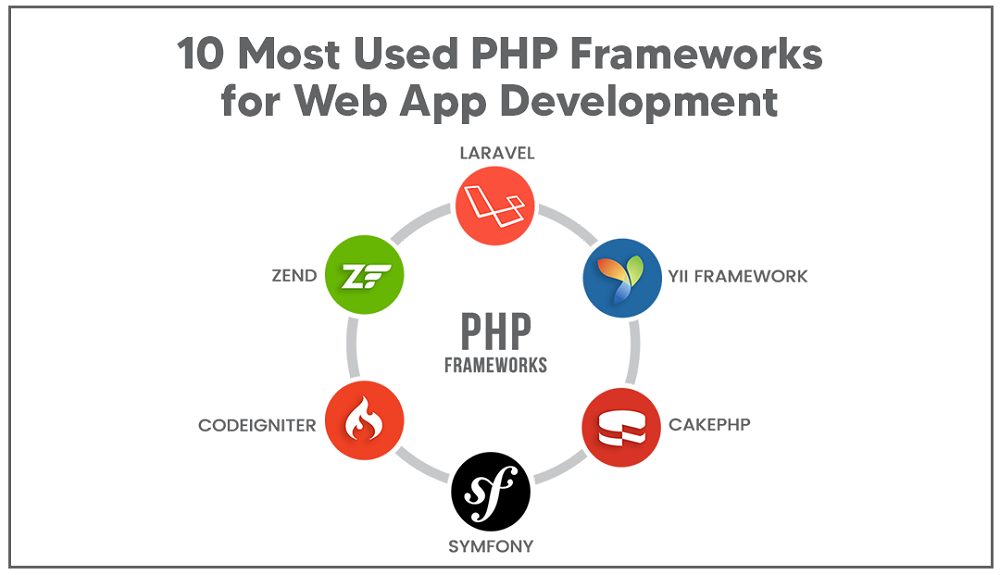*1,404,624 websites are using PHP.
*PHP has captured more than 44% share among Alexa Top 1 million websites.
(Source: Datanyze).
From 1994, when PHP was just a set of CGI binaries written in C language, to now, when PHP has a tiger’s share in the market, the programming language has stood the test of time. Today, when you go looking for a PHP development company in Perth, you’ll be spoilt for choice. The fact that it is well-suited for website development tells us why it is so popular among developers worldwide.
So, What Are Frameworks for?
Valid question. If you know how to code in PHP, what does a framework mean to you?
Well, coding in PHP does mean great websites, but it also means writing hundreds and thousands of line-long codes. And that can be a Herculean task no matter what a great coder hire. So, that brings us to the point that a great language should offer not only efficient offer code but also time-saving. And that is what PHP frameworks offer—the advantage of reusable code, the one that saves you the trouble of writing long codes from scratch every time you develop a website or a web application.
So, if you will, a PHP framework is an abstraction of PHP code within, which allows you to make selective changes to the software that offer generic functionalities. This is done via a reusable code that is, yes, user-written.
So, PHP frameworks are used for
- Making the coding/development process quick and easy
- Shortening the learning curve for PHP development
- Making cross-platform development easy (because, yes, reusable code)
- Offering better stability and scalability for the code as well as the website/application
So, now that you know why there is a need for frameworks, here are the ten most popular coders.
#1. Laravel
Released in 2011 for the very first time, Laravel happens to be the undisputed topper in the list of popular frameworks and rightly so. It is known for an impressive and elegant syntax. And it is the best for handling complex web applications that too at a higher pace than any other PHP framework. Today, it is widely used by PHP Development Services companies worldwide.
Apart from all that, it offers:
- A templating engine that is robust enough to ease functions authentication, routing, sessions, etc.
- The Artisan command-line interface that offers additional supporting commands at the time of development
- An amazing ecosystem that provides quicker hosting and distribution platform than other frameworks
#2. Symfony
Symfony enjoys the advantage of evolutions since it was launched way back in 2005. With a sizable period on the market, it has evolved into a credible framework for web apps, so much so that it may be hailed as one of the most comprehensive PHP MVC frameworks and one that complies with all the prescribed PHP standards.
It is best suited for large scale (and scalable enterprise web applications). It is owing to its comprehensive nature, the best of content management systems like Drupal and OroCram.
Symfony is a good choice because:
- It is perfectly suited for developing large-scale, enterprise level websites and software applications.
- It lends itself as an easy option as far as installation and configuration on most platforms are concerned.
- It has reusable PHP components and is stable.
- It offers the independence of the database engine.
- Its high degree of flexibility offers the advantage of cherry-picking the PHP components of your choice.
- The ability to integrate with bigger CMS like Drupal makes it preferable over others.
- It also offers great built-in testing functionality.
Nevertheless, web apps made using Symfony may not be the best in performance. The steep learning curve that it offers compared to other frameworks pulls it a bit down.
#3. Zend Framework
This one is popularly known as the ‘glue’ framework, which simply means a component-based PHP framework. It is, like many other PHP frameworks, is object-oriented and MVC-based. In short, it allows you to pick and load the very components that you need to use individual libraries. That gives you the power to ignore everything else in the framework if you want while you handpick only on those components and functions as you require.
And these two attributes enable you to reuse a considerable amount of your code. It also offers the ease of integration with external libraries for extended functionality.
It owes its popularity to:
- Component-based nature and reusable code
- Easy integration with external libraries
- Excellent for Zend complex, enterprise level applications.
- Offers simplified session management, cloud API, and data encryption.
- Offers extremely great documentation.
Nevertheless, it comes with a degree of complexity when it comes to learning. But even if for the steep learning curve, once mastered, it is as marvellous as Laravel.
As PHP continues to be one of the most preferred languages for web application development, the choice of the framework matters as much as language choice. We hope that we could shed some light on the best PHP frameworks for web development with this blog post. For more advice, you must reach out to a web development company in Jaipur to provide your honest piece of advice based on your project requirements.
